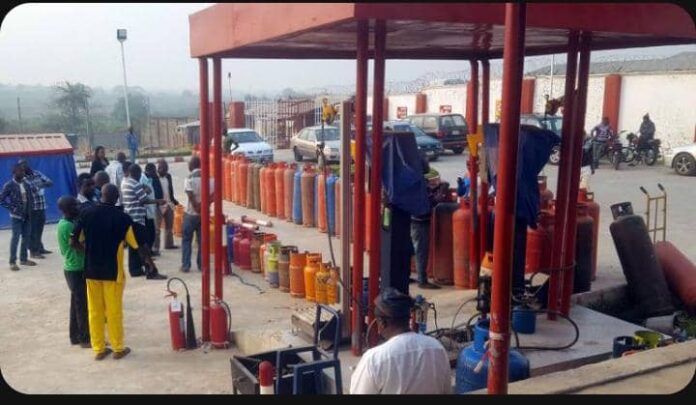By Fatima Mukhtar
A nationwide shortage of cooking gas has hit major Nigerian cities, forcing many households to adjust their daily routines as prices continue to surge sharply.
Across Lagos, Abuja, Port Harcourt, Ibadan, and other urban centers, the cost of refilling a 12.5 kg gas cylinder has risen dramatically, now selling between ₦17,000 and ₦25,000, depending on the location. In some parts of Lagos and Ogun States, a kilogram of gas now costs as much as ₦3,500, compared to ₦1,200 a few weeks ago.
The shortage, which began in late September, is largely attributed to the brief strike action by the Petroleum and Natural Gas Senior Staff Association of Nigeria (PENGASSAN). The strike disrupted operations at the Dangote Refinery and other supply points, cutting off vital feedstock deliveries and triggering a ripple effect across the country’s energy network.
Despite the suspension of the strike, supply has yet to normalize, as transport and distribution channels struggle to recover. Marketers blame limited access to depot supplies, high transportation costs, and panic buying for the continued scarcity.
“The system is still unstable,” said a Lagos-based dealer. “Even though the strike is over, we’re yet to get consistent deliveries, and prices are changing almost daily.”
The Nigerian Association of Liquefied Petroleum Gas Marketers (NALPGAM) confirmed that the supply chain remains fragile, citing overreliance on a few major suppliers and the need for more decentralized gas production facilities.
Many Nigerians are now reverting to alternative energy sources such as charcoal, kerosene, and firewood — a move experts warn could worsen health and environmental challenges.
Analysts predict that while normalcy may gradually return in the coming weeks, prices are unlikely to drop immediately due to the high cost of logistics and speculative market behavior.
The federal government is reportedly in talks with industry stakeholders to stabilize the market and ensure steady domestic supply.




